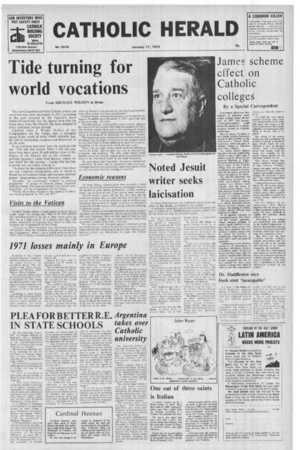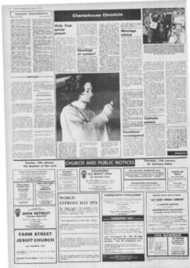Page 1, 11th January 1974
Page 1

Report an error
Noticed an error on this page?If you've noticed an error in this article please click here to report it.
Tags
Share
Related articles
News
Four Catholic Colleges To Close
Catholic Colleges Urged To Preserve Identity
Colleges To Be Closed Or Merged
Catholic Colleges Likely To Remain Unscathed
James scheme effect on Catholic colleges
By a Special Correspondent
Government directives that colleges of education must reduce student intake 40 per
cent. by 1977 and become "mini-polytechnics" could lessen the number of Catholic teachers trained in Catholic institutions.
Miss M. Hayes, President of the Catholic Teachers Federation warned of this possibility at the Federation's Annual Study Conference, which took place at Madeley College of Education near Crewe, Cheshire.
The James Report implied federation between neighbouring colleges so that a wider range of subjects could he offered for the proposed Diploma of Higher Education. But according to Miss Hayes many of the Catholic colleges were too small and in conveniently situated for development into the general purpose in. stitutes envisaged by the report. She said that federation with neighbouring institutions, at which non-Catholic student teachers were trained, could radically alter the nature of Catholic training colleges. "Very little reflection on this will reveal the threat of a diminution in the number of Catholic teachers trained in a Catholic institution." This was a matter of grave concern which demanded better liaison between schools and colleges. The training of Catholic teachers directly affected what happened in schools. In an apparent reference to comprehensivisation Miss Hayes said that Catholic authorities, without adequate buildings of finance, found it difficult to compete with the State system. Even where these problems were surmounted. Catholic schools could not match the facilities of neighbouring comprehensives in areas with a small and scattered population. Commenting on slow decisionmaking by the Department of Education, Miss Hayes, who lives in Bradford, added: "In my own diocese the three major cities are
unable to complete their differing patterns of reorganisation because permission has not yet been granted for direct grant schools to change their status in order to enter the comprehensive
system,'even when the desire to do so.
"No doubt this story can be repeated elsevvhere mans times met*, and meanwhile we are losing both pupils and teachers to the State system because the Catholic authorities are frustrated in their efforts to provide 'what is required."
The raising of the schoolleaving age had accentuated the problems of already overburdened upper schools. Pupils who were reluctant to stay on disrupted classes, while overcrowding meant that neither staff nor rooms were available for the special courses planned for the additional children over 15.
Miss Hayes thought that mutual confidence and harmony in aims between "feeding" schools and upper schools could be furthered by closer staff consultation and possibly teacher exchanges. She said it was "a great pity" that school reorganisation had eroded parental choice.
Irging the provision of nursery classes for all existing primary schools, she pointed out that if a Catholic child entered a nonCatholic nursery class it would be almost impossible to transfer to a Catholic primary school at the age of five.
On the subject of examinations, Miss Hayes suggested that the demise of the II-plus examination might be one reason for lower standards in reading and reckoning among children aged II.
Welcoming the nevv methods and organisation made possible by the gradual disappearance of this test, she hoped that some way of preserving its good points could be found, without the "ugly overtones of a competitive exam."
That there were now more Catholic schools, colleges, students and teachers than ever before was due to the sacrifice and dedication of the Catholic comnitinity, she concluded.
"It is this effort, determination and readiness to sacrifice that will ensure the continued expansion of Catholic education, which makes
suchcontributionle—tonatlie eesnsetirne t n
invalbua education system of our country."
blog comments powered by Disqus









